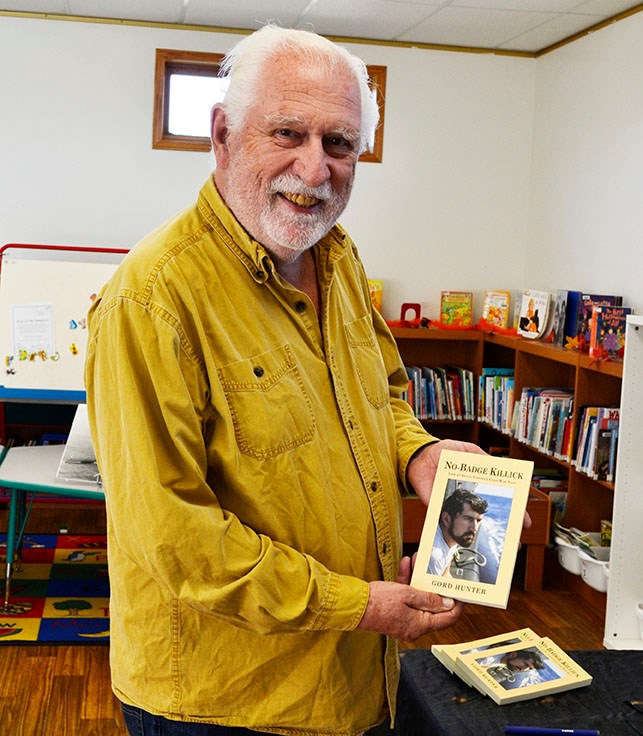Gord Hunter, who is the author of the book, ‚ÄúNo-Badge Killock‚ÄĚ, was at the ¬ť∂Ļ ”∆Ķeast Regional library in Carlyle on Tuesday, Oct. 22 doing a promotion for his book. He made a presentation of his time and experiences in the Canadian Navy, which was followed by a Q & A session.Őż
Gord was born in Grand Mere, Quebec. His family moved when he was a teen to Ste. Anne de Bellevue, which is just outside the city of Montreal.
Like many young men, his interests were not in the classroom. He left school to enlist in the Canadian Navy. He joined the service just prior to the Cuban Missile Crises and his eight-year adventure on the seas of the Atlantic began.Őż
After leaving the navy he moved to Calgary where he did landscaping until entering Mount Royal College. He studied Communication Arts and upon completion, this succeeded in him getting a job in radio with CHFM-FM Calgary. He also worked for CBC television Delay Centre at the time of the Anik satellite deployment, which brought major changes to communications in that day and time.
He again moved to the city of Montreal, once more finding employment at CTV, this time in television as a video tape editor. He then joined the trade union movement where he spent the next thirty years of his life. Gord now lives in Regina and he makes mention of the lovely sunny fall day he is enjoying travelling to Carlyle.
Having retired he began a blog and here he found that discussing the days of his service in the navy of great interest to others. This was the motivation he captured to write his book, ‚ÄúNo-Badge Killock‚ÄĚ. He tells me the book is available online and is very popular with ‚ÄĚold retired navy guys‚ÄĚ. It was a very different era then having now seen the changes in services and technology that have come to the navy.
In his talk he speaks of the Cold War and its effect it had on Canadians and the world. He recalls the cold waters off the east coast and the chill of the ocean air. He tells of his deployment on navy frigates and his continued duty at sea on naval destroyers. They were the cadillacs of the fleet and the food was far superior aboard the destroyers.
He then reflects on his time spent aboard navy submarines doing surveillance on the Russian navy. The Russians would fish just outside Canadian waters and amongst the fishing boats they would include spy ships. The Canadian navy submarines would pass through these waters trying to determine if spy ships were present, identifying them by the communication antennas that the spy ships would be equipped with.
He muses of the pleasures of being a seaman, the stargazing, describing the flying fish as magical. He recalls seeing his first totem pole in Buenos Aires and his first buffalo at the zoo in Hamburg, Germany.
Being a sailor he makes mention of rum and tells the story of each sailor‚Äôs ration of two and a half ounces daily, served just prior to lunch and having to be consumed at that moment. You were not allowed to save your ration for a later time, however, a seaman‚Äôs ingenuity would prevail and a way was found to stockpile for later. Lambs was the supplier to the navy, sporting the title ‚ÄúLambs Navy Rum‚ÄĚ. Rum truly is a navy tradition but has now been phased out due to the precise operation needed to operate the instruments that technological change has brought.
Gord’s navy tales were riveting and all those attending were treated to a special look into this man’s life and times serving his country. You will want to read this book from cover to cover before you set it down. Sailors really do tell the best stories.
Őż The book is available from Chapters/Indigo in Regina and at McNally Robinson Booksellers in Saskatoon and Winnipeg. It is also available online.
Őż




